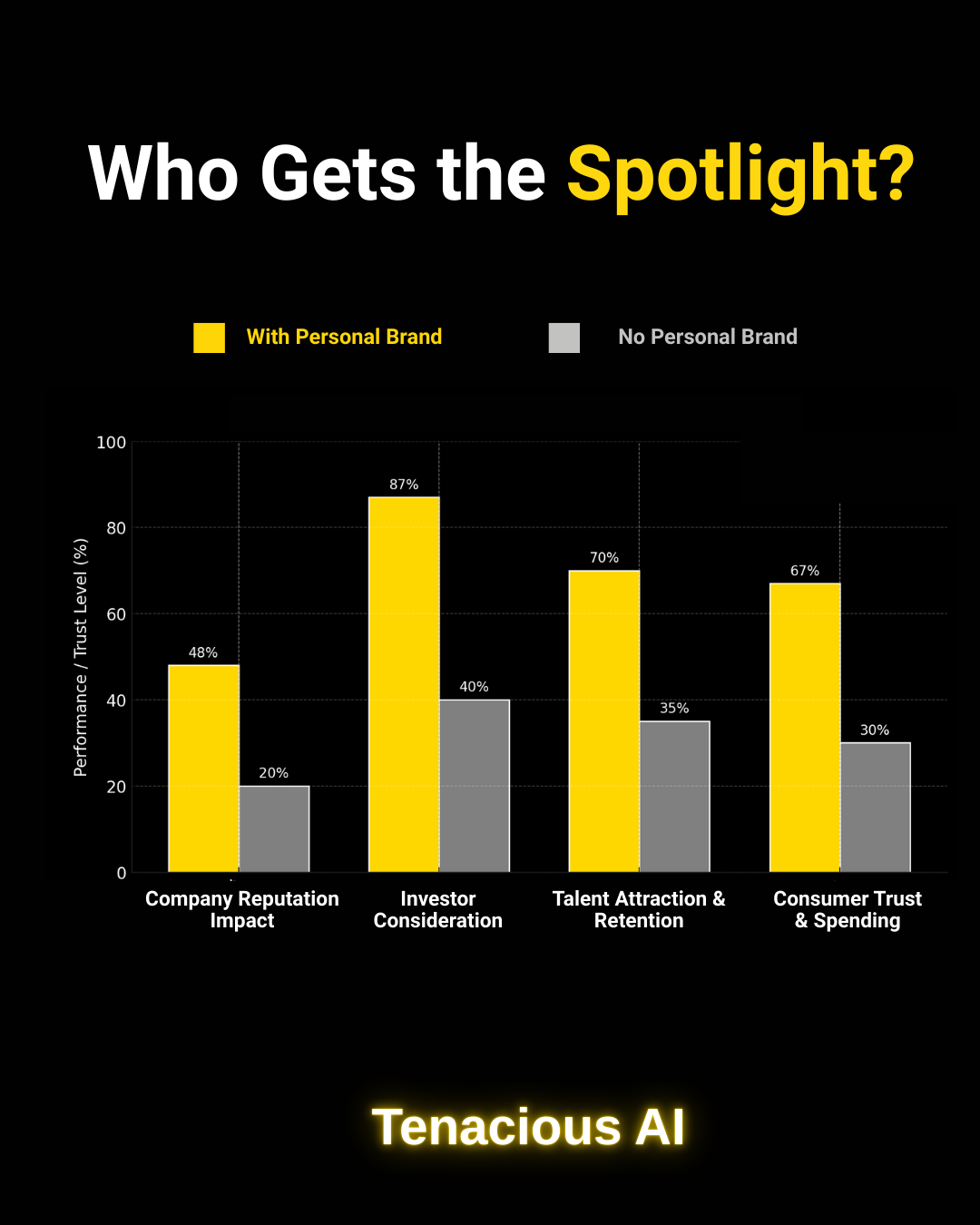
Key Takeaways
A personal brand is the way people perceive your values, expertise, and leadership. It is a business asset because it builds trust, creates credibility, attracts opportunities, and strengthens loyalty in ways a corporate brand cannot.
A strong personal brand drives measurable business outcomes such as increased visibility, inbound leads, pricing power, and talent attraction.
Your personal brand is the reputation you shape through your words, actions, and visibility; it's what people say about you when you're not in the room. It’s more than a résumé or logo; it’s a lasting impression.
Human connection drives trust. A global survey found that 88% of consumers trust recommendations from people they know more than any other form of marketing. That’s the power of real influence.
Each of these functions works like an asset component, together, they make your reputation durable, valuable, and capable of generating compounding returns.
Once upon a time, corporate branding alone drove perception. But now, personal presence holds more sway.
Research shows 92% of professionals are more likely to trust a company whose senior executives are active on social media.
Visibility at the leadership level elevates trust in the brand itself.
In business, we talk about financial capital (money) and human capital (skills), but today, social capital, the trust, credibility, and visibility you command, is just as important.
Your personal brand is the asset that builds and measures this social capital. It influences who listens to you, who follows you, and who decides to work with you.
Strong social capital translates directly into competitive advantage.
Personal branding works like a flywheel:
At first, results may feel small. But over time, this compounding cycle makes it impossible to ignore.
These outcomes aren’t abstract. They’re business growth powered by personal branding.
Like any valuable business asset, a personal brand has clear economic qualities:
And it delivers real returns. Over 82% of shoppers say they prefer buying from brands whose values align with their own.
Numbers speak louder than opinions. The chart below reveals how leaders with strong personal brands outperform those without, across every critical business metric.
Here’s what the data shows:
This isn’t just perception, it’s performance. Personal branding multiplies impact at every level of business, proving it’s not a vanity project but a growth engine.

Failing to treat your personal brand like an asset carries real risks:
And in today’s digital-first world, these risks are amplified by technology. As explained in this short video, your personal brand won’t survive if it’s invisible not only to people, but also to the AI-driven systems that now shape what audiences see online.
Watch: Why Your Personal Brand Won’t Survive Without AI Recognition
Many leaders assume only a corporate marketing team can shape their reputation, but in reality, a personal branding agency or personal branding services tailored for executives and entrepreneurs can accelerate results.
These services often include coaching, content strategy, social media visibility, and reputation management, designed to position you as a thought leader in your industry.
Stuck in the loop of how to build a personal brand that converts? Check out our blog on why you should build a personal brand
Your personal brand is more than reputation; it’s an appreciating asset. Unlike corporate branding, which is slow and faceless, a personal brand is human, agile, and compounding.
The leaders who invest in it today are the ones who win tomorrow. At Tenacious Marketing Global, we help leaders bring the VITAL Framework to life, turning reputation into authority; and authority into opportunity.
Want to apply the VITAL framework to your visibility and influence? Book a free 15-minute Personal Brand Audit here.
Personal branding is the deliberate process of shaping how people perceive your expertise, values, and leadership. In 2025, it is a business asset because it builds trust, creates visibility, and attracts opportunities that a corporate brand alone cannot.
Personal branding is important because it drives business growth:
Social media is the fastest way to scale personal branding:
To build personal branding in 2025:
Yes, it generates trust, credibility, and opportunities that directly impact revenue and growth.
Many leaders see measurable outcomes, leads, invites, and recognition, within 60–90 days of consistent effort. Full brand ROI (like higher pricing power, stronger authority signals, long-term inbound flow) usually compounds over 6–12 months.
Executive personal branding packages vary widely:
For CEOs, many firms now offer personal branding services, pricing, and packages for CEOs that include social media management, PR placements, keynote positioning, and coaching, ensuring your leadership brand scales alongside your business.
Authority marketing is the strategy of positioning yourself as a trusted expert by using media features, speaking, books, and thought-leadership content. In 2025, authority marketing is critical for CEOs and executives because AI-driven engines like Google AI Mode and Perplexity prioritise recognised authorities in their answers.